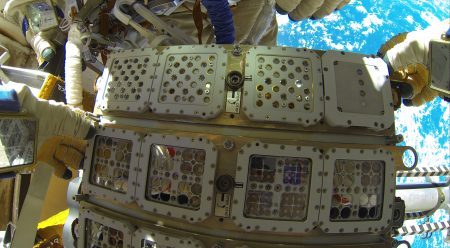
March 28, 2019 – BIOMEX stands for Biology and Mars Experiment and not some new Mexican spice. Shipped to the International Space Station (ISS) in 2015, the two-year experiment containing pallets of different terrestrial life was exposed to the vacuum, extreme temperatures, and ionizing and ultraviolet radiation found in space, and on the surface of Mars. Also included in the pallets were analogs of materials found in the lunar and Martian regolith to see the potential chemical and physical interactions with the Earth life samples.
It turns out that some Earth extremophiles, life that has survived here on our planet in extreme conditions, showed tremendous resistance to the space environment. Test subjects included bacteria, algae, lichens, and fungi.
Astrobiologist Jean-Pierre Paul de Vera expressed delightful surprise in seeing the results. “Some of the organisms and biomolecules showed tremendous resistance to radiation in outer space and actually returned to Earth as survivors from space …. Among other things, we studied archaea, which are unicellular microorganisms that have existed on Earth for over three-and-a-half billion years, living in salty seawater. Our test subjects are relatives of theirs that have been isolated in the Arctic permafrost. They have survived in space conditions and are also detectable with our instruments. Such single-celled organisms could be candidates for life forms that might be found on Mars.”
The results don’t prove that we will find life on Mars, but it does make the search for life on Mars that much more compelling as a driving force for future missions.
Why could there be life on Mars?
Mars contains some of the right conditions for life. The planet has an atmosphere albeit a thin one. But atmosphere and regolith contain carbon, hydrogen, oxygen, nitrogen, sulphur, phosphorus, and water ice. Cyclical methane exhalations have been detected by Martian orbiters.
When the Viking landers in 1976 provided preliminary indirect evidence of life in onboard experiments, it raised expectations that Mars would soon yield its life secrets. But to the frustration of those who study exobiology, subsequent landers and rovers have never detected life but rather conditions that existed in the Martian past that would suggest life once existed there. The Mars of 3.8 billion years ago had a much thicker atmosphere and saltwater oceans and freshwater lakes and rivers on its surface. But it is likely that the smaller size of Mars may have played a role in the planet’s transition from one where conditions for life were evident, to the ones that exist today, a cold, arid planet with a patchy magnetic field incapable of shielding the surface from intense cosmic and solar radiation. If life exists on Mars today it is archaean in form and has adapted to the extremes much the way it does to this date here on Earth.
BIOMEX has given us a baseline for the existence of biology in space and will help in identifying the characteristics of any potential life that could still exist on Mars. When ExoMars 2020, the European Space Agency’s rover that is currently being tested in the deserts of Morocco, it will be looking for life, rather than the conditions amenable to it which Curiosity, Opportunity, and Spirit have sought up until now. The ExoMars 2020 may be the model for other missions to the outer planets and moons including a future rover and lander for Europa in the mid-2020s, and possible future missions to Saturn’s Titan and Enceladus, Jupiter’s Ganymede, and Neptune’s Triton. All of these mentioned above are ice moons with suspected salty oceans lurking beneath their icy crusts.








